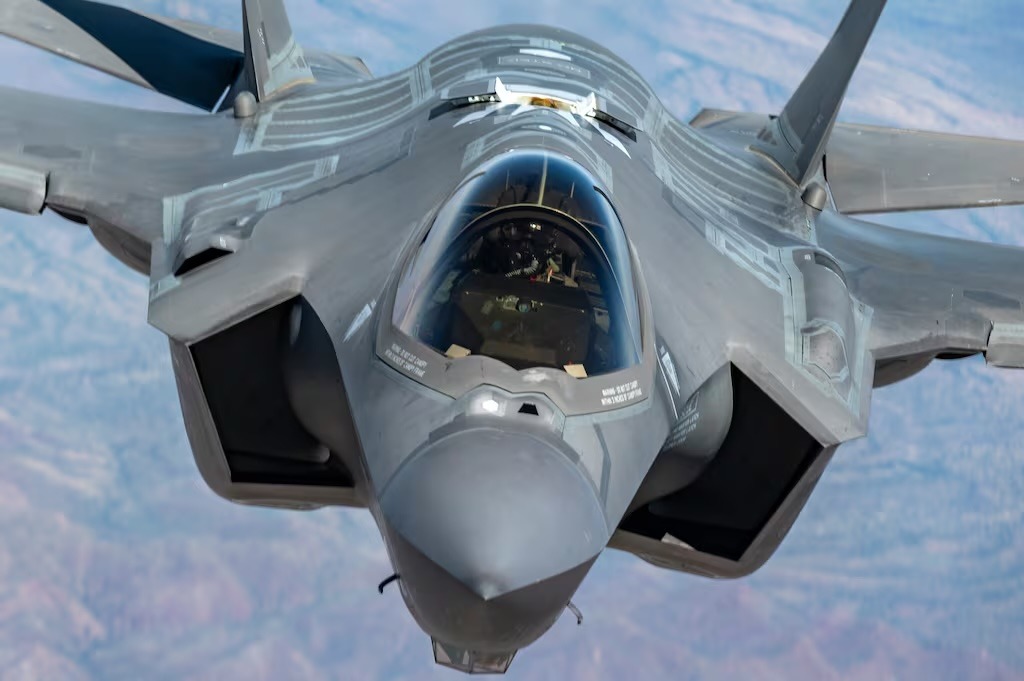The F-35 Lightning II is one of the most advanced stealth fighter jets ever built. It is currently used by the military forces of ten countries, while ten more nations are waiting to receive their first batch.
China’s Control Over Critical Materials Behind F-35
Known for its powerful radar systems, precise targeting, and stealth technology, the F-35 is often seen as a symbol of modern air power. However, a serious concern has come to light — the aircraft may have a hidden weakness or “kill switch,” and it is not under American control. Instead, China holds the real power to bring the entire F-35 program to a standstill.
At the heart of this issue are rare earth elements and other critical materials. These are special minerals used in the construction of key components of the F-35, such as its radar, weapons systems, engine, and avionics. Without these materials, the jet cannot function. The problem is that China dominates the global supply and refining of these rare earths. This means that if China stops exporting these elements, the United States cannot build or maintain its most advanced fighter jet.
The same issue affects many other American defense platforms. These include advanced submarines like the Virginia-class, powerful naval ships such as the Arleigh Burke-class destroyers, armed drones, smart bombs, and cruise missiles like the Tomahawk. Even radar systems that track enemy aircraft rely on these rare minerals. If China decides to stop supplying them, many of these powerful systems may become useless.
No ‘Kill Switch’ in F-35! U.S. Slams Conspiracy Theories on Fighter Jet Shutdown
The Rare Earths Monopoly and China’s Strategic Advantage
China produces and refines most of the world’s rare earth elements. It is responsible for over 90% of the world’s refining capacity and almost all of the refined gallium — a material important for GPS systems and radars. Gallium, along with germanium and antimony, are used in missiles, lasers, and nuclear systems. China has been tightening its grip over these materials in recent years.
In 2023, China reduced exports of gallium and germanium-related products. In 2024, it further cut exports of antimony. Then, from December 2024, it completely stopped exporting all three elements to the United States. On top of that, other key materials like tungsten and tellurium have been added to a restricted export list.
When trade tensions increased earlier this year, China responded to new US tariffs by blocking exports of even more rare earth materials. These included samarium, gadolinium, terbium, dysprosium, lutetium, scandium, and yttrium. China also restricted the sale of magnets made from these elements, which are used in nearly all advanced weapons systems.
If these export bans continue, the impact on US defense manufacturing will be severe. Without these materials, many weapons platforms, including aircraft and naval ships, cannot be built or repaired. The supply chains are deeply dependent on China, not just for mining, but also for processing and refining — areas where China holds a clear advantage.
Britain’s Nuclear Comeback: UK to Buy F-35A Fighter Jets Amid Rising Russian Threat
America’s Defense Systems and the Hidden Dependence
A single F-35 fighter uses more than 400 kilograms of rare earth elements. These materials are embedded in its engine, radar, electronic warfare systems, and weapons. The situation is even more alarming when we look at other systems. A Virginia-class submarine uses about 4,200 kilograms of rare earths, while an Arleigh Burke-class destroyer contains about 2,360 kilograms. Drones, cruise missiles, and smart bombs also use rare earth magnets for their engines, targeting, and guidance systems.
The problem doesn’t end with the F-35. The newly announced F-47 fighter and other upcoming weapons platforms will require even more of these critical elements. Currently, the United States lacks the capacity to process or refine these materials on its own. Much of the mined material, even from friendly countries like Australia, is still sent to China for processing before being re-imported.
Even the widely used F-16 fighter jet and Minuteman III nuclear missiles rely heavily on antimony — 81% of which is refined in China. Other minerals like magnesium, graphite, and fluorspar are also key to weapons manufacturing and are refined mostly in China.
No modern technology exists today that can fully replace these rare earth elements in defense applications. This means that the United States is in a vulnerable position. If China decides to fully block the export of these materials, the advanced weapons built by the US — including the powerful F-35 — could become non-functional.
This kind of control acts like a “kill switch.” Although it’s not an electronic button that shuts down the aircraft, it is a strategic advantage that can silently stop America’s defense capabilities by cutting off the supply of materials essential to keep those systems running. This hidden vulnerability makes the F-35 and many other platforms heavily dependent on an external force that the United States cannot control.
